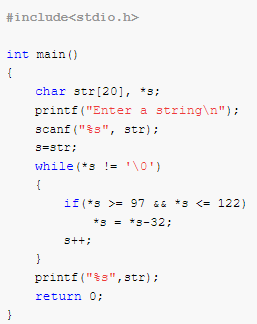1. Which of the following statements are correct about the program below?

A. The code converts a string into an integer
B. The code converts lower case character to upper case
C. The code converts upper case character to lower case
D. Error in code
2. Which of the following statements are correct about the below declarations?
char *p = “Sanjay”;
char a[] = “Sanjay”;
1: There is no difference in the declarations and both serve the same purpose.
2: p is a non-const pointer pointing to a non-const string, whereas a is a const pointer pointing to a non-const pointer.
3: The pointer p can be modified to point to another string, whereas the individual characters within array a can be changed.
4: In both cases, the ‘\0’ will be added at the end of the string “Sanjay”.
A. 1, 2
B. 2, 3, 4
C. 3, 4
D. 2, 3
3. Which of the following statements are correct?
1: A string is a collection of characters terminated by ‘\0‘.
2: The format specifier %s is used to print a string.
3: The length of the string can be obtained by strlen().
4: The pointer CANNOT work on string.
A. 1, 2
B. 1, 2, 3
C. 2, 4
D. 3, 4
4. Which of the following statement is correct?
A. strcmp(s1, s2) returns a number less than 0 if s1>s2
B. strcmp(s1, s2) returns a number greater than 0 if s1<s2
C. strcmp(s1, s2) returns 0 if s1==s2
D. strcmp(s1, s2) returns 1 if s1==s2